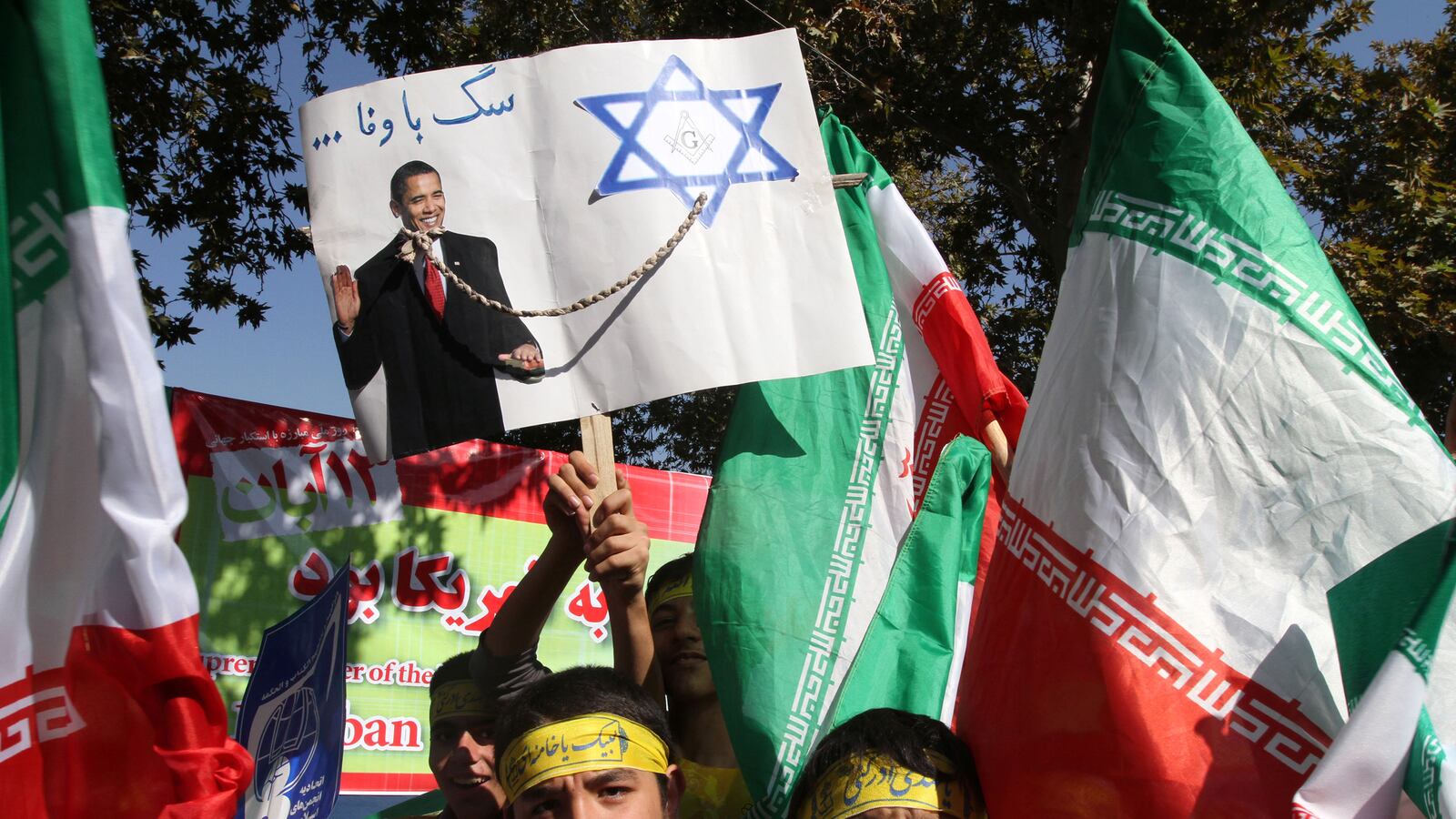On Wednesday morning, millions of Iranians stayed up to follow the American presidential election on international and Farsi-language satellite stations such as Voice of America and the BBC, many with serious trepidations about how the outcome would affect U.S.-Iran relations, not to mention the threat of military attacks Israel has made in recent months.
Over the years, Iranians have developed an awareness and sensitivity to the political agenda of American political parties and the effects those policies have on their lives. Of utmost importance during this particular election was the danger of a looming military attack on Iran, and the fact that Mitt Romney had expressed a willingness to proceed with such an action.
Just as the U.S. presidential elections saw supporters of Barack Obama and Romney polarized throughout the bitter election campaign, many Iranians inside and outside Iran were polarized—and displayed a similar bitterness.
There were those who couldn’t wait to see the Islamic Republic seriously challenged or even overthrown, and thought as president, Romney would deal with the ayatollahs once and for all. Another faction believed Obama’s reelection would lead to negotiations with Iran’s rulers, elimination of the risk of a military attack, and lifting of the back-breaking sanctions that are slowly bringing the Iranian nation to its knees.
But perhaps the most interesting reaction from the Iranian government, which could be perceived as a green light to begin or resume negotiations with the U.S., came from Mohammad Javad Larijani, who is head of Iran’s Human Rights Council and brother of both Ali Larijani, the Iranian Parliament speaker, and Sadeq Larijani, head of the Iranian judiciary.
The U.S. and Iran have not had any diplomatic relations since the 1979 Islamic revolution. While talk of negotiating with the U.S is coming to the surface of Iranian society and media, officials speak about it cautiously.
At a gathering of national university administrators in the northern city of Bandar Anzali today, Mohammad Javad Larijani said, “Negotiating with the U.S. is not a prohibited taboo. Earlier in the revolution, some reformist friends who were super-radicals considered negotiations with the U.S. as a taboo, but it appears that the Holy Spirit descended on them and they turned into super-liberals.” He added, “If the regime’s interests so dictate, we will negotiate with the U.S. and even in the depths of hell, we will negotiate with everyone.”

Alaeddin Boroujerdi, chairman of Parliament’s National Security and Foreign Policy Commission, told reporters in Tehran in October:
“Negotiations with the U.S. is one of our foreign policy’s red lines and any decision in this arena is made under the guidance of the supreme leader of the Islamic Revolution [Ayatollah Seyed Ali Khamenei].”
“Obama’s reelection paves the way for utilizing an important opportunity for diplomacy that exists between today and the Iranian New Year in March 2013,” Trita Parsi, president of the National Iranian American Council based in Washington, D.C., told The Daily Beast. “This is a period in which both sides enjoy maximum political maneuverability.
“The developments in the U.S. Senate in particular, with several moderates winning seats and hardliners leaving the chambers, is positive for the White House, since it makes it easier for Obama to get congressional approval for an agreement,” added Parsi. “In the past years, congressional opposition has cost Obama much political space on this issue.”
Kayvan, 27, who works in a computer firm in central Tehran, told The Daily Beast that during the last few days leading to the elections, many young people at work talked heatedly about the U.S election, some of them making bets on who the next president would be. “I waged a bet with five of my friends that Obama will win. I just earned $120! I am sure Romney supporters will not be showing up to work for a few days!”
Alireza, 41, an engineer, said there are a lot of jokes circulating in Tehran about the U.S. elections. “’What do Mitt Romney and the ayatollahs have in common? They don’t drink, they make other people’s bedroom and sexual affairs their own business, and they lie a lot!’” he says. “It’s astonishing that Americans would elect someone whose name is Hussein, though!” he exclaims.
But the effects of Obama’s reelection are already showing in the reactions of Iranian authorities and websites close to the rulers. “Victory of the Donkey Over the Elephant; The White House to Remain Host to the Black President,” read the headline at the hardline, conservative website Raja News.
In their article entitled “The Challenges Facing Obama During His Second Term in the White House,” Fars News Agency, a website affiliated with the Islamic Revolution Guards Corps, listed Iran at the top of Obama’s foreign-policy challenges.
“Iran’s nuclear program is one of Obama’s most important challenges during his second term ... Having postponed since July all important decisions pertaining to continuation of 5+1 negotiations with Iran to after election results, he must now prepare himself for facing this issue,” wrote Fars.
“Obama’s policies during his first presidential term indicate he is more inclined to the sanctions mechanisms and putting pressure on the Islamic Republic of Iran. Generally, most Democrats believe this process will eventually score the necessary results for the U.S.,” Fars added.
Four years ago, President Mahmoud Ahmadinejad predicted that “Zionists” would not allow Obama to win the presidential elections. This time around, when he came to New York in September, he refrained from making a prediction, lest he be wrong again.
And not everybody is optimistic. “President Obama will continue to attempt to negotiate with Iran on the nuclear issue during his second term,” Pooya Dayanim, president of the Iranian Jewish Public Affairs Committee, told The Daily Beast. “He will try a grand bargain, a mini-bargain, or any reasonable settlement of the issue. This approach will continue to put the pressure on the Iranian regime to respond and agree to a deal. Alas, I do not believe the Iranian regime will come to the negotiation table.”
“None of this will address the desire of the Iranian people for freedom, democracy, and human rights. The Iranian people must take their destiny in their own hands,” he added.
A journalist in Tehran told The Daily Beast, on the condition of anonymity, that Obama will now be a lot tougher on Iran’s nuclear program and its regional policies.
The major concern among Iranian civil society apparently is that any negotiations with the U.S. exclude the human-rights crisis in Iran.






